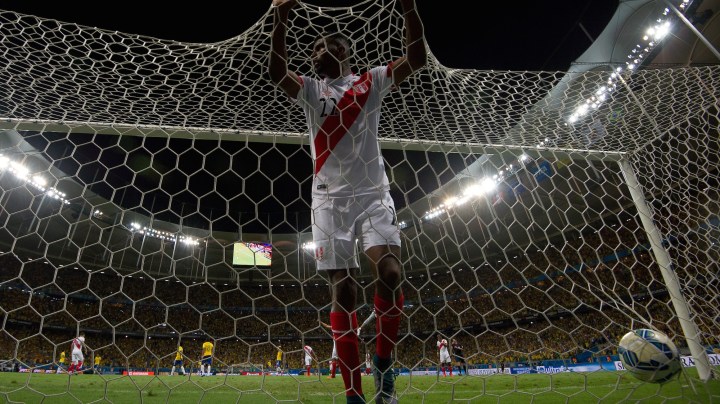Peruvians Are Pissed Most World Cup Playoff Tickets Are Going to Sponsors, Not Fans

Carlos Ascues gestures during a match between Brazil and Peru as part of 2018 FIFA World Cup Russia Qualifiers at Arena Fonte Nova on November 17, 2015. Photo by Buda Mendes/Getty Images
As Peru gears up for its monumental two-leg World Cup playoff against New Zealand, excitement has started to peak inside the Andes country. To that end, it’s being reported that over 600,000 Peruvian fans applied for a ticket lottery for the second leg at the Estadio Nacional de Lima. Officials were expecting over 3 million applicants, but even the final number of 687,196 dwarfed the number of available tickets: only 10,000 slots were being put up in the lottery.
The Estadio Nacional seats 50,000-plus fans, but only 20,000 of those seats were made available for the lottery; each of the 10,000 winners would be able to purchase two seats.The other 30,000 were held back for “sponsors,” to be used at their discretion. While a good number of those 30,000 tickets will eventually find their way into the hands of fans–be it through company hand-outs or reselling–the diminished supply will surely increase how expensive tickets are for those who were not lucky enough to win the ticket lottery.
On the secondary market, tickets for Peru’s last qualifying match against Colombia were going for roughly 4 times as much as face value, as fans knew that a win against the cafeteros would likely send Peru to the World Cup proper. One can see something similar happening with the New Zealand second leg, especially if Peru can get a good result in Auckland on Friday night. Already, tickets on resale platform viagogo are being sold for $416 just to get into the stadium; some are going for nearly $1000. As this is Peru’s best chance to qualify for its first World Cup since 1982, the hype plus the scarcity has driven prices out of range of most fans.
The idea of sponsor tickets is one of the driving forces behind how FIFA and the whole of world soccer handles revenue; as these sponsors pay premiums to be a part of the World Cup and related competitions, they are “rewarded” with first pick of tickets. It has led to a bustling secondary market, as those tickets eventually find their way to resellers, but in the meantime, by holding tickets back–and by forcing stadiums to have a certain amount of luxury and VIP seats which dig into the number of available “regular” seats–the governing bodies of soccer stand to make even more money.
Like most things at the highest levels of the world’s beautiful game, the business interests of a small percentage are put ahead of the common fan, like those who would travel early to New Zealand in order to greet their Peruvian side at the airport.
As can be expected, people immediately took to Twitter to yell at Teleticket, the company organizing the sale of the lottery tickets. The moral of the story here: don’t get between a Peruvian and their blanquirroja.